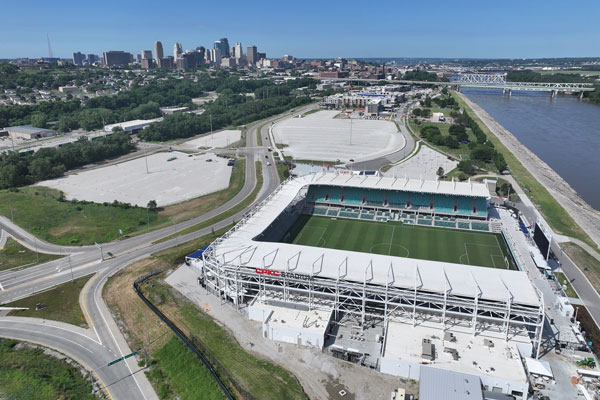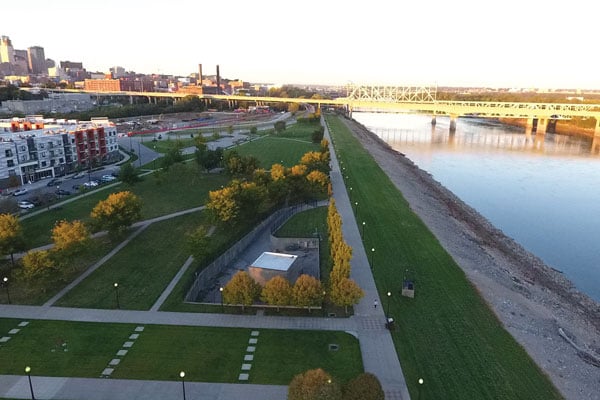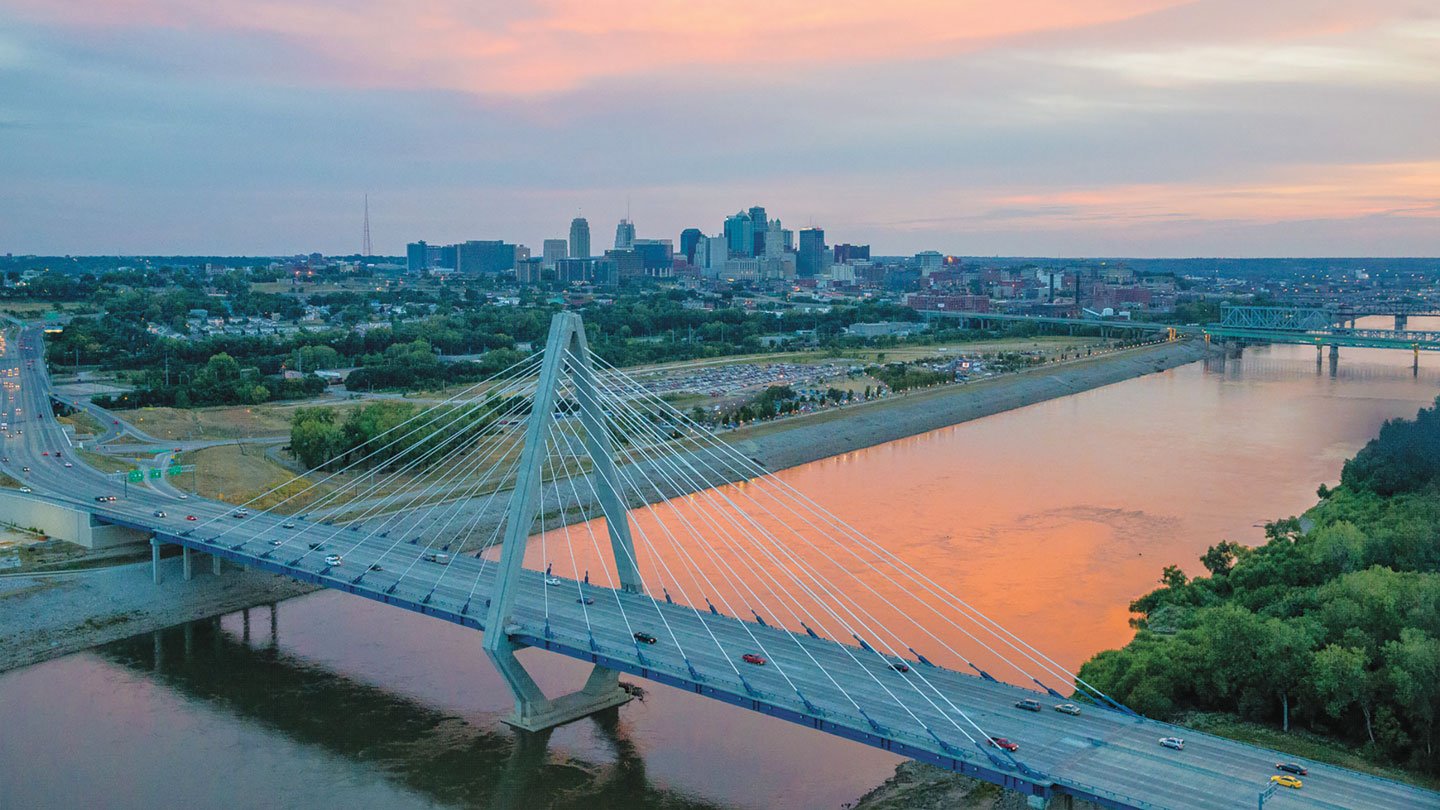The first stadium purpose-built for a women’s professional sports team provides the anchor for redevelopment in Kansas City.
Kansas City’s Berkley Riverfront is undergoing an ambitious transformation, shedding its neglected, dumping-ground past to become a mixed-use neighborhood on the edge of a revitalized downtown. Led by Port KC (the Port Authority of Kansas City), the redevelopment is turning the riverfront into a vibrant walkable neighborhood — all against the backdrop of a trail- and tree-lined Missouri River. With significant investments in transit, infrastructure and amenities, the project is creating a new kind of urban space for the region, driving economic growth and drawing attention from developers, investors and community stakeholders.
The Anchor: CPKC Stadium
At the heart of this 55-acre riverfront transformation in Missouri is CPKC Stadium, home of the Kansas City Current of the National Women's Soccer League. The 11,500-seat, $135 million stadium, located along the river shoreline, has made history as the world’s first purpose-built stadium for a professional women’s sports franchise.

CPKC Stadium is at the heart of Kansas City’s 55-acre riverfront transformation. Courtesy of Port KC
Port KC worked closely with the team and designers to maximize land use while integrating the stadium into the larger mixed-use vision. The result is a LEED Gold-certified facility with just 1,500 temporary parking spaces, prioritizing pedestrian access and public transit. The decision to forgo permanent parking in favor of a multimodal transit strategy initially raised skepticism but has proved effective.
As part of a public-private partnership, the Kansas City Current are working with Palmer Square Capital Management and Marquee Development, plus Port KC, its agency counterpart, to create a pedestrian-friendly, mixed-use district that balances sports, leisure and urban vibrancy. Berkley Riverfront Park features rock climbing, running trails, beach volleyball and a new $7 million beer garden, drawing more than 300,000 visitors annually. A riverfront arts program has provided a diverse array of large-scale murals from local and global artists.
Revitalization Delayed
Attempts to revitalize the riverfront date back to the 1940s, with various concepts — from a baseball district to an office park to a marina — all failing to materialize. Progress began in the 1990s when Port KC oversaw a $17 million site remediation that cleared the former dumping ground and tow lot to create the green space that adjoins the river. Following this, the organization opened a riverboat casino in 1996 and then Berkley Riverfront Park itself in 1999. Altogether, nearly $100 million has been invested in infrastructure for the site, such as adding new parkway lighting and trails, creating the Grand Avenue viaduct, adding a new highway interchange and integrating the site with an extension to the downtown Kansas City streetcar.

Attempts to revitalize the riverfront date back to the 1940s, but environmental factors and lack of access to the site previously hindered momentum for large-scale development. Courtesy of Port KC
However, due to continued environmental factors and lack of access to the site, more pronounced development stalled for nearly two decades. Eventually, through event programming and annual public amenity improvements, Port KC was able to attract private-sector development partners. In 2018, the 410-unit Union Apartments opened at the site. This was followed by the 353-unit luxury apartment complex CORE in 2022, and the boutique Origin Hotel and CPKC Stadium in 2024.
“As a prime location within the Kansas City region, it’s amazing to see the Berkley Riverfront fully coming to life,” said Tim Cowden, president and CEO of the Kansas City Area Development Council. “From the high-energy action we’re seeing at the CPKC Stadium to the housing under construction, the unique destination experiences underway will continue to grow Kansas City’s economic vitality, shaping our region’s appeal to both locals and visitors from around the world.”
Multimodal access is a core element of the project. The KC Streetcar Riverfront Extension, set to open before Kansas City serves as one of the host sites for 2026 FIFA World Cup soccer matches, will link the riverfront directly to the city’s core. A new pedestrian bridge and a planned vehicular bridge over major rail lines will further enhance connectivity, opening the area to a broader base of residents, workers and visitors.
Economic Impact and Future Growth
The overall Berkley Riverfront redevelopment is ongoing with multiple development partners. The Kansas City Current component is the largest and most transformational element, including total development costs that may exceed $1 billion, with phase one of the work now underway.
The first wave of riverfront redevelopment is expected to generate $310 million in new tax revenue, with $50 million in sales taxes reinvested in public amenities.
The next phase, a $280 million project set for completion in 2026, will add 429 apartments, 48,000 square feet of retail and dining, a new town square and other public spaces. Over the next decade, an additional $600 million in development is anticipated. Once complete, Berkley Riverfront will be home to more than 5,000 residents.
To ensure the riverfront remains accessible to a diverse range of residents, 10% of new apartments will be set aside for those earning less than 50% of the area’s median income.
Beyond the Property Line
Port KC plans to extend the riverfront’s revitalization to neglected levees, access roads and neighboring districts like the West Bottoms and Columbus Park. Long-term plans also include waterborne transportation through a long-envisioned marina, further enhancing connectivity and recreation.
Kansas City’s Berkley Riverfront is more than just a redevelopment — it is a new way of urban living that blends commerce with unique office opportunities, small business growth, culture and community.
Overall, the key to this type of urban redevelopment, which can be slow to materialize, is twofold:
- Build adaptable infrastructure that integrates with the larger site but that can also evolve as land use and design density changes over the development’s timeline.
- Work with trusted partners, and once momentum is achieved, keep pushing to build and develop on solid timelines.
Developers and investors can look to this project’s dynamic public-private model as a framework for future opportunities.
Jon D. Stephens is president and CEO of Port KC.
A First for Women’s Pro SportsIn October 2021, 10 months into co-owning the Kansas City Current, Angie Long and Chris Long (both of Palmer Square Capital Management), Brittany Mahomes and Kansas City Chiefs quarterback Patrick Mahomes, along with Port KC, announced plans for a privately funded, soccer-specific stadium at Berkley Riverfront Park. It would be the first soccer stadium purpose-built for a women’s professional sports team. The project’s total cost came in at $135 million. Led by an architecture, engineering and construction team based in Kansas City and driven forward almost exclusively by female project leaders, the stadium opened March 16, 2024. The construction of CPKC Stadium is unique. No seat in the stadium, which holds 11,500 spectators, is farther than 100 feet from the pitch, meaning every seat offers a close-up view of the action. The 394,600-square-foot stadium hosts nine restaurant venues inside and faces the Missouri River with an open-air, U-shaped design. Every Kansas City Current home match has sold out since the stadium opened. Generator Studio, a Kansas City-based architecture and interior design firm that specializes in sports venues, led the stadium’s design, which includes art deco features throughout its two levels. The U.S. Green Building Council awarded the stadium LEED Gold certification in 2024, making it the first stadium in Missouri to achieve that certification. The stadium’s design was created to incorporate healthy building principles. Highlights of its environmental performance include a 24% reduction in energy costs compared with a baseline building. In addition, 14% of the stadium’s energy consumption is generated from on-site solar panels. When team members enter the stadium, they see a wall featuring the opening text for Title IX — the landmark civil rights law that prohibits sex-based discrimination in schools that receive federal funding. According to the project’s interior design leader, Christina Franklin, principal with Generator Studio, “We knew from the beginning that although [CPKC Stadium was] the first of its kind, it wasn’t going to be the last. There was a sense of responsibility and pressure that came with that.” |
Connecting Sports and CREMarquee Development, the co-master developer of the Berkley Riverfront district, was born out of professional sports team ownership as the real estate arm of the Ricketts family office — the majority owners of the Chicago Cubs (Major League Baseball) and Chicago Stars (National Women’s Soccer League). The full-service developer now specializes in mixed-use sports and entertainment districts. “We believe [these] districts should be more than just a match-day gathering place — they should be dynamic destinations that enrich the surrounding neighborhoods with year-round programming and generate lasting value for teams, fans, visitors and communities,” said Eric Nordness, managing principal at Marquee Development. Marquee Development previously transformed an underutilized space next to Wrigley Field, home of the Chicago Cubs, into Gallagher Way, a 30,000-square-foot open-air plaza offering year-round events, along with a curated blend of dining, entertainment, a boutique hotel and retail spaces that activate the neighborhood beyond game days. “The Berkley Riverfront project presents a similar but unique opportunity to shape a waterfront district with a true sense of place, leveraging the site’s natural beauty and the KC Current’s visionary leadership for women’s professional sports,” Nordness said. “We’re excited to build a neighborhood that blends sports, entertainment and community in a way that feels authentic to Kansas City.” |





